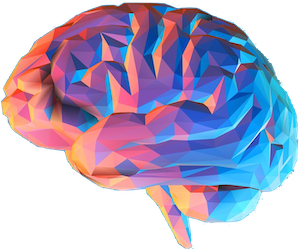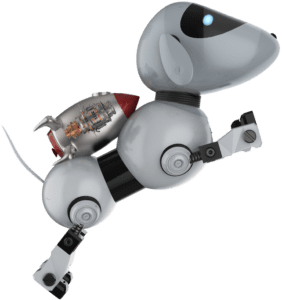THE EMOTIONAL BASIS OF DECISION MAKING
How many times have you been told not to make a decision based on your emotions? It’s drilled into our heads that we should base our decisions on logic and reason more-so than how we feel about something. Some even posit that emotions should play no role in making up our minds. In the series A Robot’s Guide To Worry, we will discuss the benefits of listening to your heart and making gut decisions in certain situations. In this article, we go further. Here, we are not just saying that it can be beneficial to listen to your emotions, but that your emotions are playing a big role in your decision-making process even when you think you are being completely rational.
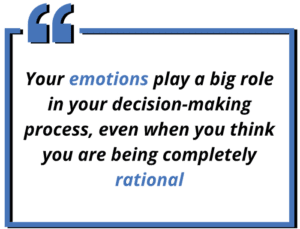 We intuitively think of decision-making as a conscious, rational process. It certainly seems like we consciously deliberate and then consciously choose, with all the activity taking place in plain view. But there is more to this story. Despite the subjective feeling of consciously deciding, there is evidence to suggest that our decisions are dependent upon unconscious, emotion-based systems. The research suggests that emotion more than just indirectly influences decisions; it plays an immediate role in the processes that choose one option over another. To understand this, we turn to the work of Antonio Damasio.
We intuitively think of decision-making as a conscious, rational process. It certainly seems like we consciously deliberate and then consciously choose, with all the activity taking place in plain view. But there is more to this story. Despite the subjective feeling of consciously deciding, there is evidence to suggest that our decisions are dependent upon unconscious, emotion-based systems. The research suggests that emotion more than just indirectly influences decisions; it plays an immediate role in the processes that choose one option over another. To understand this, we turn to the work of Antonio Damasio.
Damasio spent much of his career researching the connection between reason and emotion. Some of his more interesting findings come from his work with patients who had damage to the ventromedial area of their prefrontal cortex. This damage can occur for various reasons, often as a result of stroke, tumor, or accident. At the time when Damasio began helping these types of patients, it was unclear what role the ventromedial prefrontal cortex (vmPFC) played in human cognition.
Patients who had damage to this area seemed quite normal on the surface; however, their lives quickly fell apart after their brain injury. Though these individuals maintained their full intelligence, they had a very difficult time making decisions. This puzzled Damasio and his fellow researchers because they could detect no cognitive deficit in these patients, despite giving them a wide variety of tests. These individuals seemingly had perfect use of their rational faculties. They were able to consciously think about and weigh the options, but yet they struggled to make decisions.
Despite seeming quite normal on the surface, Damasio eventually determined that these patients had difficulty experiencing feelings. He discovered that the damage to their vmPFC knocked out much of their emotional life, and it is this deficit that made these individuals unable to make decisions. This insight led to subsequent research, which further demonstrated the connection between emotion and decision-making. Damasio theorizes that unconscious mechanisms “mark” the various options we consider with an emotional charge, and then these charges are weighed against one another. It is this unconscious marking and weighing that allows us to decide, to choose one alternative over the other.
The following passage comes from the book Descartes’ Error by Damasio. Here he describes an interaction with one of his vmPFC damaged patients.
I was discussing with the… patient when his next visit to the laboratory should take place. I suggested two alternative dates, both in the coming month and just a few days apart from each other. The patient pulled out his appointment book and began consulting the calendar. The behavior that ensued, which was witnessed by several investigators, was remarkable. For the better part of a half-hour, the patient enumerated reasons for and against each of the two dates: previous engagements, proximity to other engagements, possible meteorological conditions, virtually anything that one could reasonably think about concerning a simple date… he was now walking us through a tiresome cost-benefit analysis, an endless outlining and fruitless comparison of options and possible consequences. It took enormous discipline to listen to all of this without pounding on the table and telling him to stop, but we finally did tell him, quietly, that he should come on the second of the alternative dates. His response was equally calm and prompt. He simply said: “That’s fine.” Back the appointment book went into his pocket, and then he was off.
It is important to note that this individual was seemingly whole from a cognitive standpoint. He maintained his full intelligence and in a casual conversation would give no indication of his injury. However, he suffered significantly within the realm of decision-making. Without the ability to properly feel, without his emotional circuitry working correctly, this individual could still perform all of the rational steps involved in consciously analyzing the options, but he could not decide. Neither option felt right. He was unable to gain the felt sense of closure that comes from the unconscious, emotion-based system; hence he would continue to work at the problem in the only way he knew how: to apply more conscious thought and deliberation.
Implications for Indecision
This research has implications for those of us with a properly functioning vmPFC as well. It is quite useful for anyone to understand that there is an unconscious emotional process that frequently holds the keys to resolving internal conflict and indecision. Before we continue along this thread, as we emphasize the unconscious aspects, it is important to say that we are not denying the significant role that the Conscious Thinking System frequently plays in resolving inner conflict and indecision. Our conscious thought can be vital in this work. It is often the products of the Conscious Thinking System that get “marked” by the emotion-based system. Many of the unresolved situations we face call for further conscious thought so that we can generate new ideas and imagine further consequences. These new inputs can then be marked, tip the scales of emotional charge, and lead to resolution and decision.
But in other situations, when you feel indecisive, it is not necessarily a lack of conscious reasoning that is the cause, and further logical analysis might not help you reach a decision. When dealing with a difficult case of indecision that unexplainably defies your best conscious efforts, it can be useful to let go of rational deliberation and pay attention to any emotions that are present. In these instances, try to focus less on consciously convincing yourself that a given option is right, and instead attempt to get in touch with your gut feelings that might lead to the felt sense of resolution. Even in situations where you don’t feel anything strongly, it can still be useful to know that further thought might not be what is needed. Giving things a rest, for the time being, might be your best option. Your Unconscious Supercomputer will continue working on the problem in the background as you move through your day. Regardless of the details of the particular challenges you face, simply knowing that this emotional marking system exists will allow you to think more clearly about your decision-making process and help you better resolve internal conflict. More on decision-making to come in A Robot’s Guide To Worry.
Reason vs Emotion
To summarize the main takeaway from Damasio’s research, our rational process is not independent of emotion. Rather, our capacity to reason is built upon our system of emotion; the two are linked at the hip. Over the ages, many philosophers have portrayed reason and emotion as opposites, engaged in a constant struggle to steer the ship. Though it sometimes seems like the two are locked in opposition, the inner conflict that we experience is a bit more complicated and cannot be reduced to reason vs. emotion. We are designed to make decisions and resolve issues through competition between different drives within us. These drives are represented by opposing subsystems within the Supercomputer.
These subsystems each argue for their agenda like opposing trial lawyers, with the more persuasive winning out. When you feel the inner conflict between having a glazed donut or making the healthy choice, this is not simply a battle of reason vs. emotion. Rather, there are different subsystems of the Supercomputer in competition; one values the acquisition of energy (remember, sweet things were extremely rare in our ancestral environment); the other values long-term health. Each subsystem employs both reason and emotion to advance its agenda. All sides of the argument have emotion attached, and the unconsciously driven process of emotional marking is a huge determinant in which side wins out and takes the reins.
The Ultimate Decision Maker
The above research on the role of emotion in decision-making gives the impression that we don’t consciously make up our minds, as much as we become consciously aware that we have made up our minds. The idea that it is an emotional process that provides closure and completes the decision-making process might actually be familiar to you. You may have noticed that when you do finally make up your mind, there is a feeling. The situation now feels settled and resolved. There is a calm. Likely you attribute this feeling to being the result of conscious closure. In actuality, the relationship is usually the opposite; it is this feeling that provided closure and caused your conscious mind to settle.
So is this to suggest that it is the Unconscious Supercomputer that ultimately makes the choice? Let’s not say that. It is likely better not to focus on which part of you “makes” the decision. To think in these terms oversimplifies the process. There are many different steps involved, and there is quite a bit of back-and-forth between your Conscious Thinking System and the Supercomputer. All of the steps are essential, and no particular one should be defined as “the one.” A decision is made because of the workings of a distributed system, some parts conscious, others unconscious, each contributing. Think of your mind as a society: not one unified thing, but a collection of individuals making up the whole.
For this reason, we do not consider any single part of our mind as the final decision-maker. Similarly, we will not make a statement about whether the Unconscious Supercomputer or the Conscious Thinking System is ultimately in charge in a broader sense. The relationship between the two is extremely complex, and it can be difficult to define either precisely. In some areas, the lines grow blurry. Even amongst the best and brightest scientific minds of our time, we will not find consensus about the exact nature of consciousness.
Despite our incomplete understanding, there are some things we can say with confidence, one of which is a central theme here at Confident Robot: we do not consciously direct our lives in the way it intuitively feels. The exact role consciousness plays might not be clear, but we can say for certain that our conscious mind does not serve as CEO in the way it seems. There is much going on beneath the surface that silently influences everything that we do. Accepting this broad claim expands your view and is sufficient to get you looking around, examining your experience, and questioning your intuitive view of things. Simply being aware that there is more than meets the eye opens up a fascinating world that will allow you to understand yourself better and move through life more smoothly.
Who's In Charge?
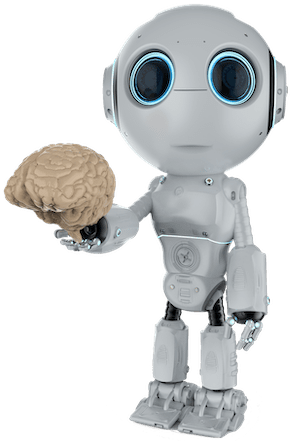
Because of the emotional nature of decision-making, your unconscious plays a huge role in the ultimate choices you make. Regardless of which part of our mind you think “makes” the decision, it is the unconscious part that assigns value to the various courses of action you are considering. In this way, it is your unconscious that is deciding what is most important in a given situation. Your Conscious Thinking System will help you work out the details; it will help you figure out how to get what you want, but what you ultimately want is largely determined by the Supercomputer. In this way, your unconscious processes play a huge role in determining the overall direction of your life.
To think that the conscious part of you is not running the show can be a little unsettling to some. As covered in the A Robot? page, nothing on this site is intended to make you feel like there is a foreign force living inside you, directing the course of your life. You are more than just your conscious thoughts, much more. You are your unconscious and it is you. You are comprised of many parts. You are the whole.
So who’s in charge? You are, the integrated whole. You guide the course of your life and are responsible for all your own decisions. You are an exquisite, choice-making machine, and you’re pretty darn good at it. Next time you are at a crossroads and are trying to figure out the path forward, take a step back and admire the back-and-forth process that occurs between the Conscious Thinking System and the Supercomputer. Notice the thoughts bubbling up. It is impressive. You are impressive.
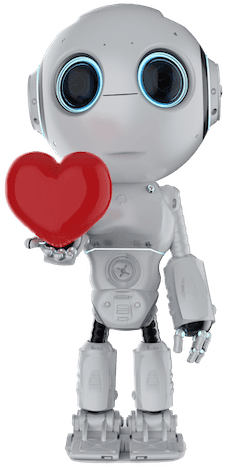
How impressive? Take a minute to consider that we were a species of otherwise unremarkable apes a mere seven million years ago. Through a few key adaptations and twists of fate, we now can understand ourselves and the universe, produce amazing feats of engineering and technology, and create sublime works of art. We are quite lucky to have the amazing brains that we do.
Further, because of the machinery running beneath the surface, we have the capacity to feel joy, beauty, and love. It can help put things in perspective to consider that these things are not inherent in the universe; we could have been built otherwise; we could have no such experiences. Despite the many hardships that come with being human, we are truly fortunate. Take pride in the amazing machinery that makes all this possible and makes you, you. Take pride in yourself, the amazing problem-solving, decision-making, love-experiencing machine.
